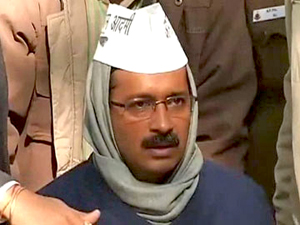 New Delhi, Feb 16: Claiming to have supported the Arvind Kejriwal Government till the very end, the Congress on Saturday accused it of running away from responsibilities and not even making an effort to introduce the Jan Lokpal Bill in the Delhi Assembly. To expose the “doublespeak” of the Aam Aadmi Party Government, it has now also decided to “issue a charge sheet” against it.
New Delhi, Feb 16: Claiming to have supported the Arvind Kejriwal Government till the very end, the Congress on Saturday accused it of running away from responsibilities and not even making an effort to introduce the Jan Lokpal Bill in the Delhi Assembly. To expose the “doublespeak” of the Aam Aadmi Party Government, it has now also decided to “issue a charge sheet” against it.
Delhi Pradesh Congress Committee president Arvinder Singh said the betrayals of the AAP Government are so many that it would take the Congress a week to prepare the charge sheet. “It will be a really big book,” he quipped.
Mr. Singh charged that contrary to the claims the AAP was making, “the Jan Lokpal Bill was never introduced in the House and so there was no question of the Congress either supporting or opposing it”. He alleged that the AAP was only fooling people on the issue just the way it had been doing on other matters.
As for the vote, Mr. Singh said “it was on tabling the message of the Lieutenant-Governor to the Speaker”.
The Congress leader said even on Friday morning his party had told the Chief Minister that it would support him with the Bill, provided it was brought in constitutionally. “We also supported their Appropriation Bill which was listed at number one, ahead of the Jan Lokpal Bill at the fifth spot. This showed their sincerity towards the issue,” Mr. Singh said.
“We were also prepared to go with them to the Centre on the Jan Lokpal Bill. But they did not want to introduce it as they did not want it passed but only kept the issue alive for political gains,” Mr. Singh said.
He also accused the AAP leader of pretension in the House saying he had waved a book Swaraj, while calling it the “Constitution of India”.
The Congress chief said Mr. Kejriwal was aware of the rule that the Lieutenant-Governor’s approval was needed for financial Bills as he had himself got the salaries of two of his advisers approved from Mr. Najeeb Jung soon after taking over the charge. “But now when the financial implications of the Bill were much more, he wanted to bypass the L-G.”
Mr. Singh also alleged that since the subsidy for power and water had only been provided up to March-end, from April onwards the residents will have to pay higher bills. But, he said, rather than resolving these issues for the people, Mr. Kejriwal, who had claimed that people had through a referendum asked him to form a government, chose to run away from his responsibilities.
Senior MLA Mukesh Sharma said the popularity of the AAP was fast waning due to such frivolous attitude. “Yesterday no more than 700 people gathered at the AAP office despite their issuing SMSs to party workers and others hours earlier about the impending resignation.”
Former Delhi Minister Haroon Yusuf said the AAP leadership ran away as it could not fulfil its promises to nearly 4.5 lakh temporary workers about regularising their jobs, to the jhuggi dwellers of giving them permanent houses and of opening 500 new schools.
Mr. Yusuf said like former Prime Minister V.P. Singh, Mr. Kejriwal believed in calling all his opponents corrupt, but history will prove otherwise.





Comments
Add new comment